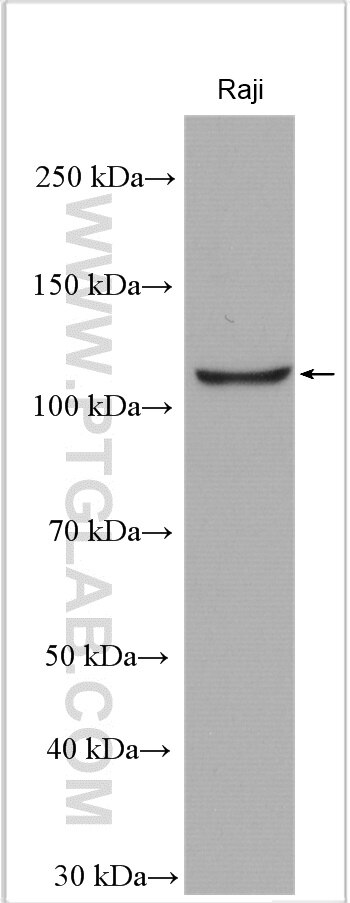TAOK3 Polyklonaler Antikörper
TAOK3 Polyklonal Antikörper für WB, ELISA
Wirt / Isotyp
Kaninchen / IgG
Getestete Reaktivität
human
Anwendung
WB, ELISA
Konjugation
Unkonjugiert
Kat-Nr. : 28403-1-AP
Synonyme
Galerie der Validierungsdaten
Geprüfte Anwendungen
| Erfolgreiche Detektion in WB | Raji-Zellen |
Empfohlene Verdünnung
| Anwendung | Verdünnung |
|---|---|
| Western Blot (WB) | WB : 1:500-1:3000 |
| It is recommended that this reagent should be titrated in each testing system to obtain optimal results. | |
| Sample-dependent, check data in validation data gallery | |
Produktinformation
28403-1-AP bindet in WB, ELISA TAOK3 und zeigt Reaktivität mit human
| Getestete Reaktivität | human |
| Wirt / Isotyp | Kaninchen / IgG |
| Klonalität | Polyklonal |
| Typ | Antikörper |
| Immunogen | TAOK3 fusion protein Ag29158 |
| Vollständiger Name | TAO kinase 3 |
| Berechnetes Molekulargewicht | 105 kDa |
| Beobachtetes Molekulargewicht | 100-105 kDa |
| GenBank-Zugangsnummer | BC002756 |
| Gene symbol | TAOK3 |
| Gene ID (NCBI) | 51347 |
| Konjugation | Unkonjugiert |
| Form | Liquid |
| Reinigungsmethode | Antigen-Affinitätsreinigung |
| Lagerungspuffer | PBS mit 0.02% Natriumazid und 50% Glycerin pH 7.3. |
| Lagerungsbedingungen | Bei -20°C lagern. Nach dem Versand ein Jahr lang stabil Aliquotieren ist bei -20oC Lagerung nicht notwendig. 20ul Größen enthalten 0,1% BSA. |
Hintergrundinformationen
TAOK3 (Serine/threonine-protein kinase TAO3) is also named as DPK, JIK, KDS, MAP3K18. It belongs to the STE Ser/Thr protein kinase family. TAOK3 acts as an activator of the p38/MAPK14 stress-activated MAPK cascade. In response to DNA damage, it is involved in the G2/M transition DNA damage checkpoint by activating the p38/MAPK14 stress-activated MAPK cascade, probably by mediating phosphorylation of upstream MAP2K3 and MAP2K6 kinases. The protein can also be autophosphorylated (PMID:20949042).
Protokolle
| Produktspezifische Protokolle | |
|---|---|
| WB protocol for TAOK3 antibody 28403-1-AP | Protokoll herunterladen |
| Standard-Protokolle | |
|---|---|
| Klicken Sie hier, um unsere Standardprotokolle anzuzeigen |


